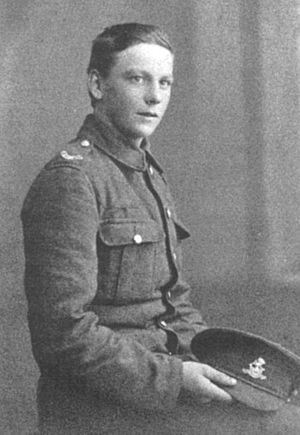Arnold Loosemore facts for kids
Quick facts for kids
Arnold Loosemore
|
|
|---|---|
 |
|
| Born | 7 June 1896 Sheffield, West Riding of Yorkshire |
| Died | 10 April 1924 (aged 27) Sheffield |
| Buried |
All Saints Churchyard, Ecclesall, Sheffield
|
| Allegiance | |
| Service/ |
|
| Years of service | 1915 - 1918 |
| Rank | Sergeant |
| Unit | York and Lancaster Regiment The Duke of Wellington's Regiment |
| Battles/wars | World War I |
| Awards | Victoria Cross Distinguished Conduct Medal |
Arnold Loosemore VC DCM (born June 7, 1896 – died April 10, 1924) was an English soldier. He received the Victoria Cross, which is the highest award for bravery in the face of the enemy. This special medal can be given to soldiers from the United Kingdom and Commonwealth countries.
Contents
A Young Soldier's Journey
Arnold Loosemore was one of seven sons. His father was a gardener in Sheffield. Arnold joined the British Army on January 2, 1915, when he was 18 years old.
He was first sent to the York and Lancaster Regiment. In July 1915, he sailed from Liverpool to join the Gallipoli campaign. This was a very difficult part of World War I. He arrived in Suvla Bay in August 1915.
Arnold survived the Gallipoli campaign and returned home. He then learned how to use a Lewis machine gun. In July 1916, he was sent to France. He joined the 8th Battalion of the Duke of Wellington's (West Riding) Regiment at the Battle of the Somme.
Victoria Cross: An Act of Incredible Bravery
On August 11, 1917, Arnold Loosemore showed amazing courage. This happened south of Langemarck, Belgium. His group of soldiers was stopped by heavy machine-gun fire.
Private Loosemore, as he was then, crawled forward. He pulled his Lewis machine gun with him through cut wire. All by himself, he attacked a strong group of enemy soldiers. He killed about 20 of them.
Right after this, his machine gun was destroyed. Three enemy soldiers rushed at him. But Arnold used his revolver and shot them. Later, he also shot several enemy snipers. He then went back to his original position. Under heavy enemy fire, he brought a wounded friend back to safety. For these brave actions, he was awarded the Victoria Cross.
Distinguished Conduct Medal: Leadership in Battle
Arnold Loosemore received another important award, the Distinguished Conduct Medal. This was on June 19, 1918, in Zillebeke, Belgium. He was out with a patrol group when his officer was wounded. Enemy bombs scattered his platoon.
Arnold showed great leadership. He gathered his men and brought them back in order. He made sure all the wounded soldiers were brought back to friendly lines.
On another occasion, he led his platoon with great skill. He ignored his own danger even under heavy machine gun fire. Because of his strong will and leadership, his platoon successfully captured the enemy post they were attacking.
Life After the War
In August 1917, Arnold was promoted to corporal. This was for his bravery on the battlefield. In May 1918, he became a sergeant.
On October 13, 1918, he was badly wounded. This happened near Villiers-en-Cauchies in France. He was hit by machine gun fire. Sadly, his left leg had to be removed above the knee.
His health was badly affected by his war wounds. He could not work. Arnold Loosemore died on April 10, 1924, from tuberculosis. He was only 27 years old. He left behind his wife, Amy, and a young son.
His wife faced financial difficulties. She was refused a War Widows pension by the government. This was because he died after the war. Also, she knew he was ill when they married. To save money, he was buried in a shared grave with three other people.
Legacy and Remembrance
Arnold Loosemore's Victoria Cross and Distinguished Conduct Medals were sold in 1969. An Australian collector bought them. In July 2023, the medals were sold again for £220,000.
In the early 1980s, a street in Sheffield was named Loosemore Drive. This was done by the Lord Mayor. A memorial plaque was put up to mark this event. But it was removed many times due to vandalism. A new bronze plaque replaced the missing one in December 2014.
The story of Arnold Loosemore's widow being refused a pension was shared. Channel 4 TV highlighted it in November 2014. This was in a program called 'WW1's Forgotten Heroes'.
 | Lonnie Johnson |
 | Granville Woods |
 | Lewis Howard Latimer |
 | James West |

